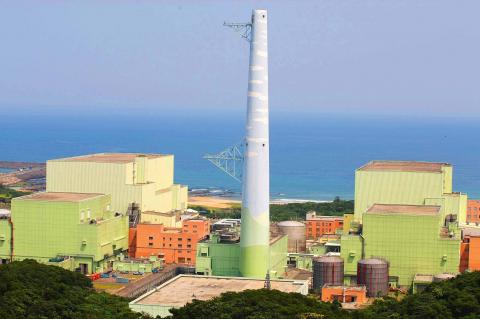Taipei Mayor Hau Lung-bin (郝龍斌) yesterday stood firm on his opposition to the continued construction of the Fourth Nuclear Power Plant, amid concern from the Presidential Office and the Chinese Nationalist Party (KMT) about his stance on the issue.
Hau became the first local government head from the pan-blue camp to declare his stance on the nuclear issue by saying on Thursday that he would vote “yes” in a national referendum asking voters if construction and operation of the plant should be suspended.
His announcement prompted President Ma Ying-jeou (馬英九) to call him on Thursday night to discuss his stance on the power plant. Ma met him yesterday in the Presidential Office to continue their discussion on the issue.

Photo: CNA
Presidential Office spokesperson Lee Chia-fei (李佳霏) said Ma and Hau exchanged opinions on the construction of the power plant, alternative sources of energy and the potential impact on the economy if the plant is suspended.
“The president said whether or not the Fourth Nuclear Power Plant should be suspended is a crucial issue, and the public must be given sufficient information to help them make the final decision,” she said.
Hau yesterday said he opposed the construction of the power plant because of the state-owned Taiwan Power Co’s (Taipower) poor quality control over the plant and its failure to solve the problem of storing nuclear waste.
“I told President Ma that under the current situation, I would support suspension of the Fourth Nuclear Power Plant if the referendum is held tomorrow. My stance will not change,” he said.
As the government prepares for a national referendum on the issue, Hau said he believed the public would gain a better understanding of the power plant’s operations and its safety issues, and that a public consensus could be formed gradually.
“If more and more people oppose the plant’s construction, or local city councilors voted to oppose its construction, the government can reconsider the necessity of holding a referendum,” he said.
At a question-and-answer session at the legislature yesterday, Premier Jiang Yi-huah (江宜樺) said that he, the president, New Taipei City Mayor Eric Chu (朱立倫) and Hau were in frequent contact with each other to exchange views about the power plant.
“We all share the same position,” Jiang said when answering questions from KMT Legislator Hsu Shao-ping (徐少萍).
Hau’s statement that he would vote for halting construction was predicated on the “referendum being held tomorrow,” Jiang said.
“We understand that people are concerned about the nuclear power plant’s safety, which is why the government is set to invite internationally recognized experts to conduct a comprehensive safety assessment of the power plant,” Jiang said.
Once the safety assessment is completed and related information on nuclear safety is made public, people will be more well-informed before the referendum, he said.
Separately yesterday, KMT Secretary-General Tseng Yung-chuan (曾永權) led about 30 members to visit the plant in New Taipei City’s (新北市) Gongliao District (貢寮).
KMT spokesman Yin Wei (殷瑋) said party members visited the plant’s pumping station and control room and asked Taipower to ensure transparency in disclosing public information about the plant.
The KMT’s nuclear policy remains the same, which is to ensure nuclear safety and to reduce the nation’s dependence on nuclear power gradually, he added.
Additional reporting by Shih Hsiu-chuan

Japanese footwear brand Onitsuka Tiger today issued a public apology and said it has suspended an employee amid allegations that the staff member discriminated against a Vietnamese customer at its Taipei 101 store. Posting on the social media platform Threads yesterday, a user said that an employee at the store said that “those shoes are very expensive” when her friend, who is a migrant worker from Vietnam, asked for assistance. The employee then ignored her until she asked again, to which she replied: "We don't have a size 37." The post had amassed nearly 26,000 likes and 916 comments as of this

US President Donald Trump said "it’s up to" Chinese President Xi Jinping (習近平) what China does on Taiwan, but that he would be "very unhappy" with a change in the "status quo," the New York Times said in an interview published yesterday. Xi "considers it to be a part of China, and that’s up to him what he’s going to be doing," Trump told the newspaper on Wednesday. "But I’ve expressed to him that I would be very unhappy if he did that, and I don’t think he’ll do that," he added. "I hope he doesn’t do that." Trump made the comments in

Tourism in Kenting fell to a historic low for the second consecutive year last year, impacting hotels and other local businesses that rely on a steady stream of domestic tourists, the latest data showed. A total of 2.139 million tourists visited Kenting last year, down slightly from 2.14 million in 2024, the data showed. The number of tourists who visited the national park on the Hengchun Peninsula peaked in 2015 at 8.37 million people. That number has been below 2.2 million for two years, although there was a spike in October last year due to multiple long weekends. The occupancy rate for hotels

A cold surge advisory was today issued for 18 cities and counties across Taiwan, with temperatures of below 10°C forecast during the day and into tonight, the Central Weather Administration (CWA) said. New Taipei City, Taipei, Taoyuan and Hsinchu, Miaoli and Yilan counties are expected to experience sustained temperatures of 10°C or lower, the CWA said. Temperatures are likely to temporarily drop below 10°C in most other areas, except Taitung, Pingtung, Penghu and Lienchiang (Matsu) counties, CWA data showed. The cold weather is being caused by a strong continental cold air mass, combined with radiative cooling, a process in which heat escapes from